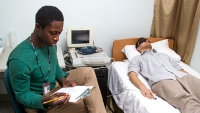Hallucinogens and Club Drugs

Hallucinogens and club drugs occupy an ambiguous position in psychiatry and medicine. At the same time that they can be abused, they may also have potentially therapeutic or beneficial effects, particularly in medical settings. Accordingly, our Division is conducting research to better understand the mechanisms, risks, and clinical implications of this class of psychoactive compounds. For example, the club drug 3,4-methylenedioxymethamphetamine (MDMA) is thought to have pronounced prosocial effects that may motivate recreational use. By giving MDMA to healthy humans and measuring brain activity and behavioral effects, we have demonstrated that MDMA leads to pronounced prosocial effects unique among other psychostimulants or drugs such as THC. Other research in our Division is investigating how the unique psychoactive effects elicited by hallucinogens may facilitate behavioral treatments. These research projects have implications for better understanding why these compounds might be used recreationally, as well as for clarifying the neurobiology of social and self-improvement behavior.
Faculty Conducting Research on Hallucinogens and Club Drugs: